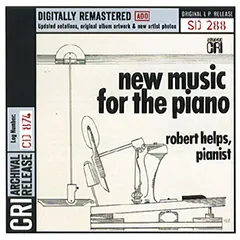




By Jed Distler, Classics Today, 1999 [updated: 9/4/2001]
↑Various composers & works • Robert Helps, pianist (CRI 874)
Next >In the mid-1960s composer Joseph Prostakoff compiled New Music for the Piano, an anthology of works by 24 American composers. The collection was published under the auspices of the Abby Whiteside Foundation. Robert Helps was one of the contributing composers, and, like Prostakoff, a former Whiteside piano student. Prostakoff proposed that Helps record the anthology, and he agreed. RCA Victor released a double-LP set in 1966 and the Whiteside Foundation distributed it to 600 American libraries and educational radio stations. Later CRI reissued the set on LP, and now on CD, save for three selections by Leo Kraft, Arthur Berger, and Vivian Fine already available on other CRI CD releases.
As a budding undergraduate new music pianist in the early 1970s, I often borrowed the original RCA LPs from my college library. Not all of the music suited my late-adolescent tastes, but something about the piano player touched me as few other keyboard artists have done before or since. I was mesmerized by Helps’ rich, liquid sound, far-reaching dynamic range, and his way of executing fast, thorny passages so that all the notes would sing, dance, and breathe. Reflective, lyrical passages were spun out in long, perfectly proportioned lines, while even the thorniest Milton Babbitt, George Perle, and Mel Powell serial figurations emerged with clear foreground and background patterns. Bob’s pianism contrasted with that of many so-called new music specialists andtheir percussive, notey, and dynamically (and emotionally) constipated playing.
I later got to hear Helps in person, and tried my best to absorb his relaxed yet concentrated platform demeanor, deep musicality, and effortless physical economy at the Even when he took enormous chances, you’d still feel as if you were in safe hands. Eventually Bob and I became colleagues and friends, and I had the honor of presenting him in two 1997 New York recitals (type Q2608 in Search Reviews for more information).
Revisiting this collection, I marvel anew at the performances while realizing how well most of the compositions stand the test of time. In fact, some of my favorite pieces are by lesser-known names. The longest work here, Norman Cazden’s seven-and-a-half-minute Sonata Op. 53 No. 3 from 1950, is a blazing, compact neo-classical romp well worth reviving. Peggy Glanville-Hicks’ Prelude for a Pensive Pupil, Sol Berkowitz’s 1958 Syncopations, and Hall Overton’s Polarities No. 1 fuse jazz and classical harmonic languages with organic ease. (Overton is best known for his fabled Thelonious Monk big band collaborations.) Paul A. Pisk’s evocative Nocturnal Interlude would make an effective encore on any recital, and Prostakoff’s wispy Bagatelles take canny advantage of the piano’s registral geography. Helps told me that Ernst Bacon’s The Pig Town Fling got a lot of airplay on a pop music radio station based in Paterson, New Jersey! And why not? It’s certainly witty and tuneful in its gentle, funky way.
Kent Kennan’s two 1951 Preludes are wonderfully terse and well crafted, as are Mark Brunswick’s subtle Six Bagatelles from 1948/50. Helps’ own 1957 Image embraces Roger Sessions’ craggy atonal idiom from a more poetic and pianistically congenial vantagepoint. To experience Babbitt’s Partitions under the fiery, dynamic hands of its dedicatee is a galvanizing experience far removed from Robert Taub’s cooler, primmer traversal on Harmonia Mundi.
Sonically speaking, I wonder if CRI used the production tape rather than the actual session master reels for its digital transfer. I bring up this point because I hear tiny, telltale instances of wow and flutter. There’s also a high degree of tape hiss, which possibly could have been eliminated without compromising the pianist’s tone. But these are minor, niggling points that honestly won’t impede your listening pleasure. What started as an impartial record review has turned out to be an unabashedly biased valentine. Thanks to CRI for continuing its good work on behalf of Robert Helps, one of America’s most underrated and greatest living pianists.